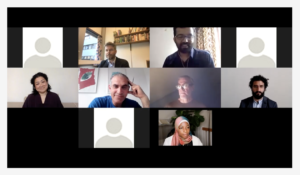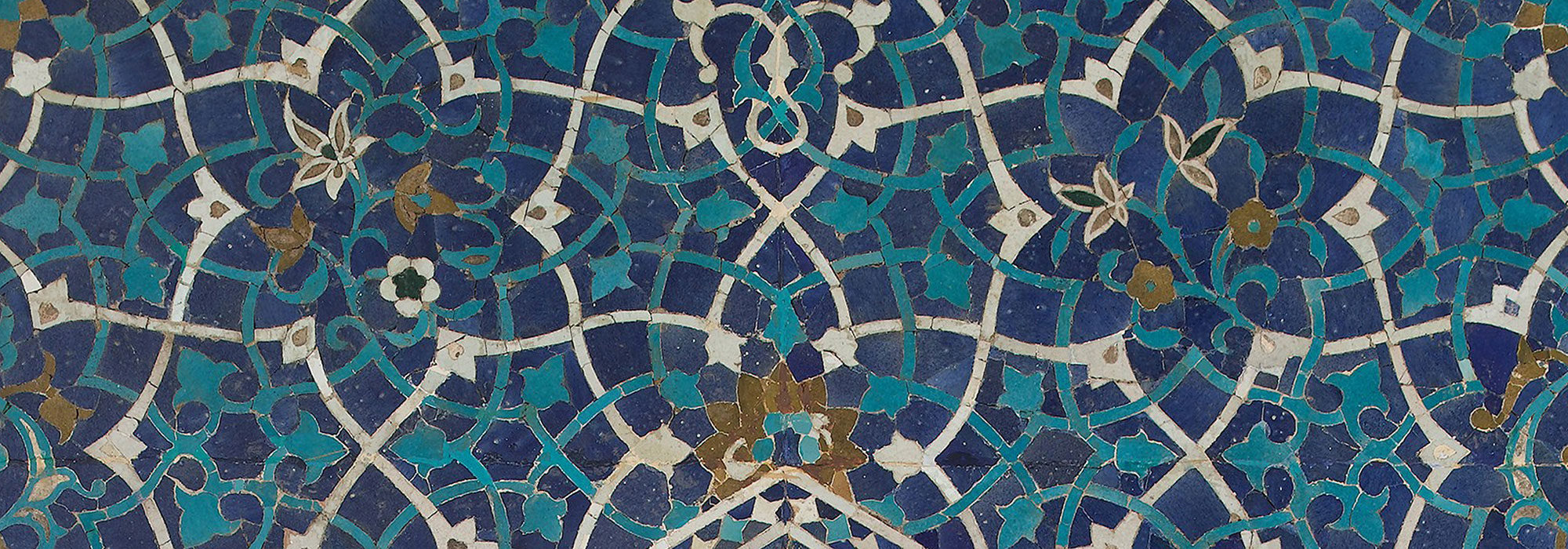Past Lectures
Can’t make it to our events? Check out videos of our lectures and lunch talks held at Harvard by visiting the Program in Islamic Law Vimeo channel.

“The use and usefulness of the concept of codification”
On Thursday, May 27th, Professor Intisar Rabb presented on a panel titled “The use and usefulness of the concept of codification ” in the CanCode: Canonization and Codification of islamic Legal Texts Roundtable. Rabb joined panelists Mohammad Gharaibeh (Humbolt U. Berlin), Iza Hussin (U. of Cambridge), Yossef Rapoport (Queen Mary, U. of London), and Brannon Wheeler (US Naval Academy). The panel was moderated by Mahmood Kooria (Leiden University). Maribel Fierro (CSIC-Madrid) and Mohammad Fadel (University of Toronto) were respondents.
Courts and Canons (CnC) project presented by Omar Abdel-Ghaffar and Jamie Folsom
On Tuesday, June 8th Omar Abdel-Ghaffar and Jamie Folsom presented the Courts and Canons (CnC) project, which is an interactive, collaborative project that places the Islamic legal tradition in historical, socio-political, and geographic context, at the Digital Humanities Summer Institute.
Ahmet Faruk Çelik, “AI for Comparing and Understanding Ottoman Fatwa Collections”
On Monday, March 22, 2021, Ahmet Faruk Çelik presented “AI for Comparing and Understanding Ottoman Fatwa Collections” as part of our Islamic Law, Data Science, and AI Lab.
On Monday, March 8, 2021, Professor Zahra Moballegh presented “Beyond God the Commander Data Analysis Uncovering the Narrator God and Reconstructing an Islamic Narrative Theology” as part of our Islamic Law, Data Science, and AI Lab.
Reza Takhshid, “NLP for Lawyers and Islamic Law Scholars”
On Monday, February 22, 2021, Reza Takhshid presented “NLP for Lawyers and Islamic Law Scholars” as part of our Islamic Law, Data Science, and AI Lab.
Issam Eido, “Early Ḥanafī Approaches to Islamic Legal Interpretation, 3rd/9th – 4th/10th Century”
On Tuesday, March 23, 2021, Professor Issam Eido presented “Early Ḥanafī Approaches to Islamic Legal Interpretation, 3rd/9th – 4th/10th Century.”
On Tuesday, February 23, 2021, Dr. Sohaib Baig presented “Towards a Transregional History of Sunni Legal Pluralism: Indian Hanafis in the Indian Ocean, 1500-1926.”
Roundtable on Islamic Legal History & Historiography – Live Webinar
On Friday, March 5, 2021, the Program in Islamic Law hosted a live webinar to conclude and discuss the various contributions to the Roundtable on Islamic Legal History and Historiography. In light of recent developments in the field, we convened this Roundtable on Islamic Legal History and Historiography to take stock of myriad changes developments in approaches to the study of Islamic law and legal history.
Elias Saba, Harmonizing Similarities: A History of Distinctions Literature in Islamic Law
On Tuesday, November 17, 2020, Dr Elias Saba (Grinnell College, Senior Lecturer, Departments of History and Religious Studies) spoke on his new book, Harmonizing Similarities: A History of Distinctions Literature in Islamic Law .He was joined by discussant Professor Ahmad A. Ahmad (UC-Santa Barbara) and Program in Islamic Law Research Fellow, Dr. Sohaib Baig, moderated the event.
Closed captioning is hard coded on to the video.
On Tuesday, December 8, Dr. Nathan Spannaus (University of Jyväskylä, Postdoctoral Researcher, Department of Social Sciences and Philosophy) will speak on his new book, Preserving Islamic Tradition: Abu Nasr Qursawi and the Beginnings of Modern Reformism. Program in Islamic Law Research Fellow Dr. Sohaib Baig moderated the event.
Closed captioning is hard coded on to the video.
On October 20, 2020, Prof. Elizabeth Urban (West Chester University, Assistant Professor of History, Department of History) spoke on her new book Conquered Populations in Early Islam: Non-Arabs, Slaves and the Sons of Slave Mothers. She was joined by discussant Prof. Matthew Gordon (Miami University, Philip R. Shriver Professor of History, Department of History).
Closed captioning is hard coded on to the video.
Nurfadzilah Yahaya, Fluid Jurisdictions: Colonial Law and Arabs in Southeast Asia
On September 15, 2020, Prof. Nurfadzilah Yahaya (National University of Singapore, Dept of History) spoke on her new book, Fluid Jurisdictions: Colonial Law and Arabs in Southeast Asia. She was joined by discussant Dr. Iza Hussin (University of Cambridge, Pembroke College, Dept. of Politics and International Studies), author of the book, The Politics of Islamic Law: Local Elites, Colonial Authority and the Making of the Muslim State.
Closed captioning is hard coded on to the video.
Adnan Zulfiqar, “Mapping COVID-19 Fatwas Project”
On Friday, August 7, 2020, Professor Adnan Zulfiqar (Rutgers University) presented “Mapping COVID-19 Fatwas Project” as part of our Digital Islamic Law Lab series.
Najam Haider, “What Geography and Maps Can Sound Like”
On Friday, July 10, 2020, Professor Najam Haider (Barnard College) presented “What Geography and Maps Can Sound Like” as part of our Digital Islamic Law Lab series.
Jamie Folsom, “Courts and Canons Project”
On Friday June 26, 2020, Jamie Folsom (Performant Software) presented the Courts and Canons (CnC) project as part of our Digital Islamic Law Lab series
Symposium & Book Release: al-Muwaṭṭaʾ, the Royal Moroccan Edition (Part I)
Symposium & Book Release: al-Muwaṭṭaʾ, the Royal Moroccan Edition (Part II)
On December 9, 2019, Professor Intisar Rabb, Faculty Director of the Program in Islamic Law (PIL), and PIL Research Fellow 2019-2020, Dr Dana Lee, convened the symposium on the newly released al-Muwatta’ Royal Moroccan Edition book translation. Panelists included authors and translators Professor Mohammad Fadel (University of Toronto, Faculty of Law) and Vice Chancellor Connell Monette (American College Casablanca), alongside commentators Professor Kecia Ali (Boston University), Professor Ahmed El Shamsy (University of Chicago), and PIL Research Fellow 2018-2020 Dr. Mariam Sheibani.
Maya Shatzmiller, “Equity and Equality: The Economics Behind Women’s Property Rights in the Islamic Law”
On October 22, 2019, Professor Maya Shatzmiller (University of Western Ontario), gave a lecture on “Equity and Equality: The Economics Behind Women’s Property Rights in Islamic Law.” Shatzmiller presented her years long work on women’s property rights and economic development during the medieval period in the Middle East.
Mohammad Fadel, ” Spousal Abuse and Islamic Law Reform”
On March 28, 2019, Professor Mohammad Fadel (University of Toronto) gave a lecture at Harvard Law School’s Program in Islamic Law on “Nushuz, Lawful Discipline and Spouse Abuse in the Maliki Madhab: A History and Its Relevance to Modern Islamic Law Reform.” He discussed examples of Muslim judges from Mamlūk and Andalusian courts seeking out cases of spousal abuse rather than waiting for those cases to be brought before them, thereby treating marriage rights as a matter of public law.
Marion Katz, “Wives, Housework, and the Changing Boundary between Islamic Law and Ethics”
On Feb 13, 2019, Professor Marion Katz of New York University (NYU) gave a lecture at Harvard Law School’s Program in Islamic Law on “Wives, Housework, and the Changing Boundary Between Islamic Law and Ethics.” She explored the historical-legal controversies over domestic labor and the construction of gender and relationships in Islamic law on the books and in the social practices of Muslim communities. The event was live-tweeted under the hashtag #KatzLecture.
2019 Harvard Sports Law Symposium, Keynote Address: Mahmoud Abdul-Rauf
As the keynote address to the 2019 Harvard Sports Law Symposium, former NBA player and civil rights activist Mahmoud Abdul-Rauf spoke about his childhood, basketball career, and experience advocating for social justice in the United States. Harvard Law School Professor Intisar Rabb initiated the conversation in a fireside chat.
As an NBA player, Abdul-Rauf refused to stand for national anthem in protest to US oppression, for which he was suspended by the NBA on March 12, 1996. An agreement was reached two days later with the league whereby he would stand during the playing of the national anthem but could close his eyes and look downward.

